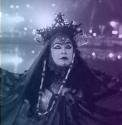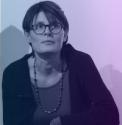Documentation:
- A Personal Reason Why - the issues pdf 35.4 KB
- A review by Penny Simpson pdf 47.79 KB
- Full information pdf 183.81 KB
The day Nato started its bombing campaign on Serbia was day 3 of the Magdalena Aotearoa Theatre Festival in New Zealand; that evening the theatre group DAH from Belgrade were programmed to perform. Amidst the panic of trying to telephone their children, spouses, parents, rearranging flights in order to get back home, they had to field endless ambivalent commiserations from other festival participants. That evening they did perform – it was their response and only weapon of opposition. I knew that since the group formed in 1992 their theatre work has been focussed on resistance against their government through daily direct protest actions on the streets of Belgrade and the more hidden metaphorical protest in their touring performances.
As witness to this situation I experienced a deep sense of uselessness. Anything said in comfort sounded hollow - words of outrage equally empty. In recent history we can highlight many examples of the part that theatre and its community have played in the process of political change. Immediately prior to the fall of the Berlin Wall, theatre workers in eastern Europe took a significant and influential role in challenging the communist regimes.
In Colombia, a country engaged in a perpetual internal war, Patricia Ariza of Teatro La Candelaria works to make a renowned Rap Opera with street children and music theatre pieces with women and children whose husbands and fathers have been murdered in the drug wars - despite the fact that during the extreme political repression of the early eighties she was one of many artists on the official death list.
At a theatre festival in Peru in 1988 I saw a piece by a theatre group from Ayacucho a town caught in the cross fire of the Sendero Luminoso and the military. I thought the work amateur. But later when I was informed that the group, 3 in number, once had 16 members and that the rest had disappeared one by one - I realised I had seen an extraordinary piece of work.
And recently I read about a man who had a tiny photography business in Macedonia. In two months he has taken passport photos, free of charge, for any incoming refugee who has come to him. His attempt to help give back a hope of identity. To date he has taken nearly 27,000, leaving himself thousands in debt. The images themselves are raw in quality, but as a body of work or as an act, their power is undeniable.
The above are all examples of artistic actions that have moved me, have made me question my relationship to theatre. I have found it hard to cite actions or work that I can recognise as having this "effect" in my own, current Western European/North American, theatre culture.
So Why The Br/leeding Ground?
I have to speak in a very personally way. I left New Zealand with a nagging voice telling me that I had to "do my job much better", and to question the relevance that a theatre practice in Wales has to the situation of conflict in other people"s countries.
I would like to explore these questions:
- whether there is an effective artistic response in a time of political crisis and conflict?
- whether it is feasible for those of us safe from the "firing line" to artistically comment from the comfort of our studios?"
- what is our role is as theatre artists in a time of war?
- whether art can be an act of passionate or kind heroism?
- or whether it can it have more effect by making detached commentary or interpretation?
- Is art an act of resistance by definition?
- Should art be distanced - or should it be right in there at the front?
- Or should art's place be precisely on the cross-roads of the two?
The BR/LEEDING GROUND event, constructed from process, collaboration, contemplation, debate and testimony is one attempt to examine these questions. It is an opportunity to witness the response of distinct artists and intellectuals to the complexity of the problem of the role of art in politics and the role of politics in art.
Concurrently, as we in Wales elect our first national parliament for 600 years, the Arts Council is shifting its policies radically by slashing the funding of a number of internationally recognised companies (including the Magdalena Project) and the innovative individual work of young independent Welsh performers. Wales, they argue, must have a National Theatre and Dance Company, work for and give testament to our nations talent; and it is towards this aim that the funds are redirected.
What legacy does this policy leave to the new generation of young artists? Will they ever be able to consider their art, their job, as an act of effective resistance or a tool of political change.
Jill Greenhalgh
Artistic Director of the Magdalena Project
June 1999
Jill Greenhalgh




